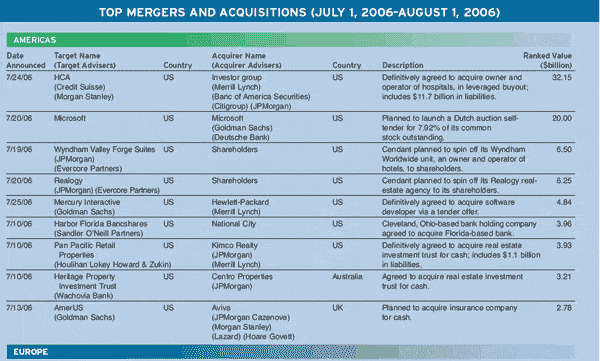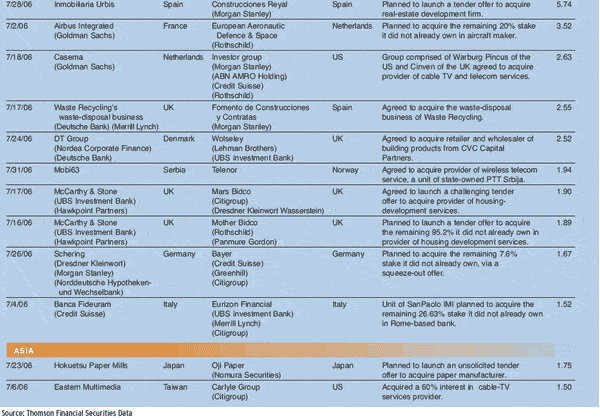MERGERS & ACQUISITIONS
In the biggest leveraged buyout ever, three private equity firms agreed in late July to take Nashville, Tennessee-based hospital operator HCA private for $21.3 billion of cash and the assumption of $11.7 billion in debt, or a total value of $33 billion. The investor group was made up of Boston-based Bain Capital; Kohlberg Kravis Roberts, or KKR; and Merrill Lynch Global Private Equity; along with Thomas F. Frist, HCA’s founder. The previous record LBO was the $25 billion buyout of RJR Nabisco in 1989.
Less than two weeks after the HCA deal, KKR joined with technology buyout group Silver Lake Partners and AlpInvest Partners of the Netherlands to acquire an 80.1% stake in Royal Philips Electronics’ semiconductors business. The group won after beating out two other private equity consortia in a hotly contested auction. Amsterdam-based Philips retained a 19.9% stake in this business, which is a leading supplier of silicon-based systems for mobile telephones, consumer electronics and digital displays.
The transaction, which put the enterprise value for the computer-chip business at about $10.6 billion, was financed by Europe’s biggest-ever sale of high-yield bonds. Bain Capital and Apax Partners later said they would join the winning consortium.
Credit Suisse and Bank of America acted as lead M&A; financial advisers to the consortium, with ABN AMRO also providing advice. Clifford Chance and Simpson Thacher & Bartlett served as legal advisers.
Meanwhile, as Global Finance went to press, a private equity consortium led by Providence Equity of the United States and including KKR, Blackstone and Britain’s Cinven was in talks with senior management of Britain’s largest cable company, NTL, about a potential buyout deal that would value the company at about $20 billion and which would make it the biggest buyout in Europe ever.
Private equity firms approached NTL unsuccessfully last year before the company closed its $6 billon acquisition of Telewest, a smaller UK-based cable firm. NTL completed its $1.9 billion acquisition of Virgin Mobile in July, making Richard Branson the cable company’s biggest shareholder.
Record Year for Fundraising
The buyout firms keep breaking their own records for LBOs in a year when they are expected to raise a record $300 billion, as endowments, pension funds and other institutional investors seek higher returns than are available in public markets, according to Private Equity Intelligence, a London-based firm that does research on the market.
New York-based Blackstone Group in July raised $15.6 billion for the world’s biggest buyout fund. “This fund will allow us to undertake transactions of a size and complexity that was inconceivable just a few years ago,” chairman and CEO Stephen Schwarzman said in a statement.
KKR, which raised $5 billion in May with the public float of an investment unit, is near closing a second fund that will be three times as big. Fort Worth, Texas-based Texas Pacific Group is raising a new fund that is expected to be about $15 billion.
Britain-based private equity fund Permira closed a new fund at $14 billion in July, making it the largest European private equity fund. Canadian investment firm Onex raised $3.5 billion, creating that country’s largest buyout fund.
Worries About a Credit Bubble
 |
|
|
In the US, M&A-related; loan volume reached $256 billion in the year-to-date through August 24, according to Dealogic. That was an increase of 85% over the same period last year.
New Participants Lack Experience
There are a lot of new players, some of whom have left investment banks to set up their own private equity firms and who may lack the experience of the big, established buyout firms, and they need to be careful, Stephenson warns.
According to Dealogic, the largest providers of syndicated leveraged loans are the big US commercial banks, including JPMorgan Chase, Bank of America and Citigroup, followed by Germany’s Deutsche Bank and Credit Suisse.
The longevity of the private equity investment boom will be a function of the debt markets, says David Grimes, partner and member of the private equity team in the New York office of Reed Smith. “So far, the capital markets have been very receptive,” he says. “If this favorable environment continues, LBO activity will continue as well.”
Although interest rates have risen both in the US and Europe, average spreads to government bonds on high-yield debt are still relatively low.
As private equity firms look for a home for the funds pouring in from institutional investors, they are looking at different and more-regulated industries, such as insurance and life sciences, says Grimes. “Their geographic horizons also have expanded,” he says.
‘Club Deals’ Increase Buying Power
Funds cannot commit a significant percentage of their capital to a single deal because of restrictions in the fund documents, Grimes says. As a result, the private equity firms join together in so-called “club deals” that enable them to participate in major buyouts as a member of a consortium.
Meanwhile, investors are engaged in a flight to quality, according to Grimes. “Everybody wants to be in the top quartile of returns,” he says, “which makes it easier for the best funds to raise money.” This could make it hard for a pension fund to get in, however, since the private equity funds can choose who the limited partners will be, he notes.
The widespread availability of debt for sponsor-backed buyouts and aggressive lending by banks is contributing to the growth of the industry not only in the US but in Europe as well.
European Markets Mature
“There has been tremendous activity in the European market due to the maturation of those markets and some privatizations, as well as the need for family-held businesses to look for an exit as the generations pass,” Grimes says.
European sponsor-backed public-to-private M&A; volume totaled $56.5 billion in the year to date as of August 23, an increase of 257% from $15.8 billion in the same period a year earlier, and the highest on record, according to Dealogic. Transportation was the most-active European sponsor-backed buyout industry so far this year, with $30.1 billion of deals, followed by the publishing industry, with $11 billion.
Citigroup leads among advisers to European public-to-private buyouts this year, with a volume of $42.6 billion from five deals, followed by Rothschild, with $40.4 billion via eight deals, Dealogic says.
Private equity firms Warburg Pincus and Cinven agreed in August to buy the second-largest Dutch cable television company, Essent Kabelcom, for $3.3 billon. This followed an earlier agreement by the same private equity firms to acquire another Dutch cable company, Casema, for $2.7 billion. Warburg Pincus already owns Multikabel, the number-four cable company in the Netherlands.
COMPETING BIDS ON THE INCREASE
A total of 45 target companies globally received competing bids totaling $345 billion in the year to date through August 16, an increase from 35 companies in the same period a year earlier that received $185 billion in competing bids, according to Dealogic.
Vancouver-based Teck Cominco dropped plans in August to sweeten its hostile offer for Inco, the Canadian mining company, to $19.6 billion from $18 billion, after it failed to raise the additional funds. Teck Cominco withdrew a proposed $5.1 billion equity offering, a private placement that would have been Canada’s largest-ever equity offering, a day after it was proposed.
The withdrawal of Teck Cominco from the bidding left the all-cash bid of Brazil-based Companhia Vale do Rio Doce, or CVRD, as the most likely winner for Toronto-based Inco as Global Finance went to press. Another friendly offer from Phoenix, Arizona-based Phelps Dodge was also on the table but was seen as unlikely to succeed because of its smaller cash portion.
The mining industry, with a volume of $90.5 billion through eight bids, is the most targeted industry for competing bids so far this year, followed by transportation with $68.3 billion via five bids, according to Dealogic. Canada is the most targeted home country this year for competing M&A; bids, with a volume of $94.8 billion from 14 bids, followed by the United Kingdom, with $73.5 billion via 10 bids, and Spain, with $59.4 billion through four bids.
Meanwhile, investors appeared to favor Swiss metals group Xstrata’s hostile bid of $17 billion for the 80% of Falconbridge, a Toronto-based producer of copper and nickel, that it did not already own. Xstrata’s all-cash offer beat out Phelps Dodge, which had hoped to carry out a three-way merger with Falconbridge and Inco.
| AMERICAS M&A;: TOP DEAL ADVISERS | ||||
| Adviser | Rank Value ($millions) |
Rank | % Mkt Share | # of Deals |
| Goldman Sachs | 337,388 | 1 | 44.1 | 98 |
| Lehman Brothers | 250,765 | 2 | 32.8 | 77 |
| JPMorgan | 179,655 | 3 | 23.5 | 103 |
| Citigroup | 179,497 | 4 | 23.5 | 80 |
| Credit Suisse | 138,712 | 5 | 18.1 | 90 |
| Industry Totals* | 765,355* | 5,250 | ||
| UROPE M&A;: TOP DEAL ADVISERS | ||||
| Adviser | Rank Value ($millions) |
Rank | % Mkt Share | # of Deals |
| Citigroup | 291,956 | 1 | 41.4 | 64 |
| JPMorgan | 275,023 | 2 | 39.0 | 78 |
| Merrill Lynch | 264,161 | 3 | 37.5 | 43 |
| BNP Paribas | 256,154 | 4 | 36.3 | 51 |
| Morgan Stanley | 255,604 | 5 | 36.2 | 70 |
| Industry Totals* | 705,288* | 5,322 | ||
| ASIA M&A;: TOP DEAL ADVISERS | ||||
| Adviser | Rank Value ($millions) |
Rank | % Mkt Share | # of Deals |
| Goldman Sachs | 60,477 | 1 | 30.7 | 31 |
| Citigroup | 34,074 | 2 | 17.3 | 24 |
| Morgan Stanley | 27,024 | 3 | 13.7 | 33 |
| UBS | 26,536 | 4 | 13.5 | 23 |
| Mizuho Financial Group | 21,581 | 5 | 11.0 | 62 |
| Industry Totals* | 196,866* | 4,454 | ||
| January 1, 2006 – August 1, 2006 |
Source: Thomson Financial Securities Dat | |||
* Figures may not add up as more than one bank typically obtains credit for any one transaction.





